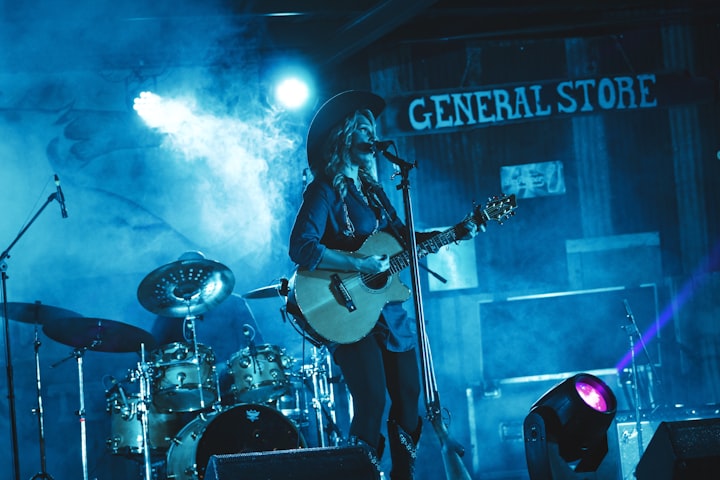Country Music
The Heartbeat of America

Country music, with its roots deeply embedded in the soil of rural America, has evolved over centuries to become a genre that resonates with people around the world. From the Appalachian Mountains to the honky-tonk bars of Nashville, country music has been a reflection of the American experience, capturing the essence of heartache, resilience, love, and the simple joys of life. In this exploration of country music, we will journey through its history, evolution, notable artists, and its enduring influence on American culture.
The Origins of Country Music
Country music, as we know it today, has its origins in the folk traditions brought to America by European immigrants in the 17th and 18th centuries. These settlers from Scotland, Ireland, and England brought with them a rich musical heritage that would meld with the rhythms and melodies of Native American and African cultures. The result was a unique blend of musical styles that laid the foundation for what would become country music.
One of the earliest forms of country music was Appalachian folk music, which emerged in the mountainous regions of the southeastern United States. With its haunting ballads and rustic instrumentation, Appalachian music captured the hardships and struggles of early American settlers. Artists like the Carter Family and Jimmie Rodgers would later popularize this style, earning them the title of "the first family of country music" and "the father of country music," respectively.
The Birth of Commercial Country
The early 20th century marked a turning point in the history of country music, as technological advances such as phonograph records and radio broadcasts allowed the genre to reach a wider audience. In 1927, Ralph Peer's recording sessions in Bristol, Tennessee, famously discovered talent like the Carter Family and Jimmie Rodgers, helping to establish country music as a commercial genre.
During the Great Depression, country music resonated with people facing economic hardships. Songs like "Hobo Bill's Last Ride" by Jimmie Rodgers and "Wildwood Flower" by the Carter Family captured the struggles of the era, providing solace to those who found themselves on the fringes of society.
The Nashville Sound and Honky-Tonk
In the post-World War II era, country music underwent a significant transformation with the emergence of the Nashville Sound. Pioneered by artists like Patsy Cline and Jim Reeves, this subgenre of country music incorporated lush orchestration and polished production techniques. It appealed to a broader audience, moving country music away from its rural roots and into mainstream pop culture.
Concurrently, honky-tonk music gained popularity in the 1940s and 1950s. Characterized by its raw, unvarnished sound, honky-tonk celebrated the working-class lifestyle and became the soundtrack of the honky-tonk bars and dancehalls scattered across America. Icons like Hank Williams, Sr., and Merle Haggard are synonymous with this gritty, honky-tonk style.
Outlaws and the 1970s Renaissance
The 1970s brought a rebellion against the polished Nashville Sound, led by a group of artists known as the Outlaws. This movement sought to preserve the authenticity and grit of country music. Figures like Willie Nelson, Waylon Jennings, and Johnny Cash challenged the status quo, embracing a more rebellious image and sound. The Outlaws breathed new life into country music and made it accessible to a younger generation.
The 1970s also saw the rise of country-pop with artists like Dolly Parton and Kenny Rogers crossing over into the mainstream with hits like "Islands in the Stream" and "Jolene." These crossover successes further solidified country music's place in the broader American musical landscape.
Diversity in Country Music
Country music has often been associated with rural, white America, but its roots are far more diverse. African American musicians, such as Charley Pride, Linda Martell, and DeFord Bailey, have made significant contributions to the genre. Additionally, artists like Loretta Lynn and Dolly Parton have used their platform to advocate for women's rights and gender equality within the industry, challenging traditional gender roles.
In recent years, country music has seen a resurgence of diverse voices, including LGBTQ+ artists like Lil Nas X and T.J. Osborne, challenging long-standing norms and expanding the genre's horizons. This diversity reflects the changing face of America and its music.
Country Music's Influence on American Culture
Country music has a profound influence on American culture, extending beyond its musical boundaries. Its storytelling tradition has inspired countless books, films, and television shows, capturing the essence of small-town life, heartache, and triumph. Iconic songs like "I Will Always Love You" by Dolly Parton have transcended the genre to become global classics.
Country music's impact is also evident in fashion, with cowboy boots, hats, and western wear remaining enduring symbols of the genre. Country line dancing and square dancing continue to be popular social activities, connecting people through shared dances set to country tunes.
Conclusion: The Enduring Legacy of Country Music
Country music, born from the struggles and stories of everyday Americans, has evolved into a genre that transcends cultural and geographical boundaries. Its ability to capture the human experience—whether it be love, loss, or the joys of life on the open road—has made it a cherished part of American culture.
From its humble beginnings in rural Appalachia to its status as a global phenomenon, country music remains a testament to the resilience and creativity of the American spirit. It continues to evolve and adapt, embracing new voices and stories, while staying true to its roots. Country music is not just a genre; it's the heartbeat of America, echoing the stories of a nation and its people for generations to come.
About the Creator
solomon Christian
A first class graduate of mathemathics at the University of Technology lautech.






Comments
There are no comments for this story
Be the first to respond and start the conversation.